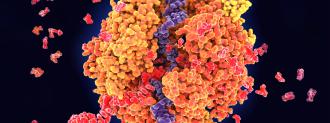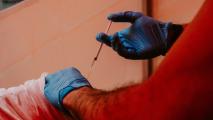Stanford biochemist Rhiju Das is getting help — from gamers.
Das is developing COVID-19 vaccines based on RNA — an innovative approach currently making the media rounds thanks to Moderna.
RNA vaccines have their advantages: namely, the speed and scale at which they can be made. But there are challenges, too. RNA is a fragile molecule, degrading rapidly outside of a cell. If the RNA can be kept cold, it will stay stable, but the costly infrastructure required to distribute it may hinder efforts to get the vaccine to the millions or billions of people who will need it.
Developing COVID-19 vaccines that can be kept stable in a wider range of temperatures will be crucial to rolling them out, especially in developing countries and hotter climates.
To aid in his efforts to create a more stable RNA molecule — chronicled by NOVA and summarized in Stanford’s medical blog Scope — Das is turning to a video game.
Eterna is a puzzle game co-created by Das. Players attempt to design novel RNA molecules, folding them into idiosyncratic structures to accomplish different tasks. By clicking base pairs and — quite satisfyingly — folding up your RNA molecule, you can help design molecular medicines.
Gamer’s newest task? Helping to fight COVID-19.
“The coronavirus is an RNA machine,” the announcement for Eterna’s new initiative says. “Let’s take it on.”
Eterna players from around the globe will be focusing on puzzles revolving around SARS-CoV-2’s RNA biology, RNA diagnostics, and antiviral therapies, as well as developing COVID-19 vaccines with mRNA vectors.
“We’re trying to recruit — potentially — millions of people to come play a video game,” Das tells NOVA. “The solutions they are providing very well could become a medicine that is injected into billions of people.”
According to Scope, gamer’s answers have already inspired the publication of more than 20 scientific articles.
Eterna players are being joined by an army of citizen scientists working on developing COVID-19 vaccines and antivirals. The University of Washington is crowdsourcing potential antiviral seeds using their protein folding game Foldit, while Folding@home is recruiting spare computer power tout le monde to the same end.
We’d love to hear from you! If you have a comment about this article or if you have a tip for a future Freethink story, please email us at [email protected]






